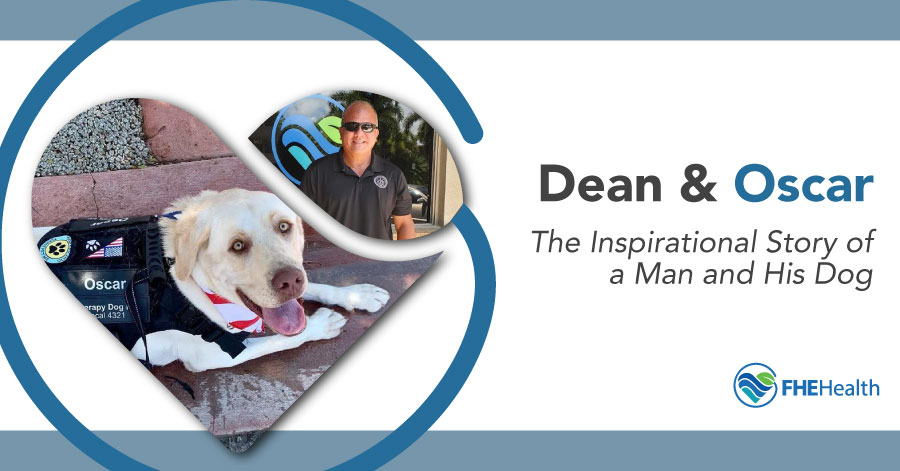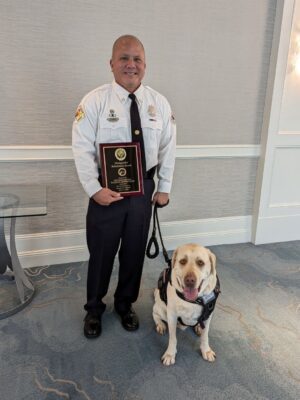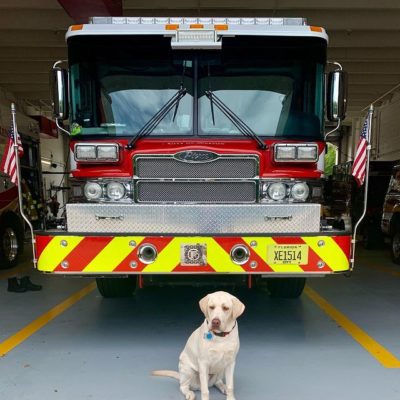
The “First Responder Paws Therapy Dog Award” is now in its second year and accepting applications, so we wanted to update you on the original therapy dog team that made it all possible: veteran firefighter Dean Moreno and his yellow lab Oscar. The pair has been supporting first responders and their community of Broward, Florida, and beyond, by being present in moments of crisis, visiting clients in our treatment program for first responders, and acquiring and training more therapy dogs for first responder agencies. (Learn more about Moreno’s organization, First Responders Pack Foundation, which FHE Health is partnering with, here.)
Moreno shared the following update about Oscar, who at four-and-a-half years of age is now in the prime of his life in doggie years and at the top of his profession:
- In June, Oscar received the “Rikki Mitchell Animal Achievement Award” from the Florida Bar Animal Law Section, which recognizes one dog in the state of Florida for their exemplary service.
- Oscar is currently one of five finalists competing in the therapy dog category of the prestigious “American Humane Hero Dog Award.” There are five different categories for this national award, and the winner of each category will compete for the national title.

Oscar and Dean Moreno at Florida Bar Annual conference, where Oscar received the “Rikki Mitchell Animal Achievement Award”
If you’ve not read it since it aired in November 2021, catch the moving story of how Oscar and Moreno first met and teamed up below.
The Story of a Man and His Dog
Dean Moreno was not a dog owner until a yellow Labrador puppy named “Oscar” entered his life less than two years ago. Oscar is a therapy dog. He is trained to respond to people with mental health needs and to intervene in crisis situations like the Surfside collapse in Miami Beach earlier this year.
Today, Oscar lives 24/7 with Dean, an active firefighter in his 23rd year of public service, and the two of them are often recognizable at events in the Broward County community. In September the pair received the “Firefighter of the Year” award from the city of Weston, Florida.
The pair’s close bond and shared mission to help those in need did not arise out of nowhere. It originated with Dean’s own personal journey to find hope and healing from his own experiences of trauma….
Two Traumatic Events That Led a Man to His Dog
 Two traumatic events in his career as a firefighter inspired Moreno to search for help and personal healing. The first occurred when Moreno’s oldest daughter, now 30, almost passed away at the age of 13 from unexplainable heart problems: “Her heart went in all different directions. She went to the Mayo Clinic to be treated, and while that was going on I was still working…”
Two traumatic events in his career as a firefighter inspired Moreno to search for help and personal healing. The first occurred when Moreno’s oldest daughter, now 30, almost passed away at the age of 13 from unexplainable heart problems: “Her heart went in all different directions. She went to the Mayo Clinic to be treated, and while that was going on I was still working…”
During that period, Moreno got a dispatch call regarding a 14-year-old boy who “had been learning to scuba dive for the first time and tragically drowned in the ocean.”
“We were en route to the hospital and the father kept reaching over to me and asking me, ‘Please don’t let my son die,’” Moreno recounted. “That was going on at the same time my daughter was going through her ordeal … When we got to the hospital, I couldn’t go into the ER and broke down.”
The second event that traumatized Moreno was the 2017 shooting at the Fort Lauderdale airport. Moreno was in Terminal 3 when the shooting began in Terminal 2, sending hundreds of terrified people running and screaming in different directions.
“All of our training is about securing the scene first,” Moreno said. “You do not go in and put yourself in a position where you might be involved in a danger until the scene has been secured. With the airport shooting, all that went out the door and instinct kicked in.”
Moreno, who was unarmed, had only a radio and no medical equipment. When he saw the first victim bleeding in their arm, Moreno used the victim’s wife’s jacket to make a tourniquet. Meanwhile, he was madly radioing in to confirm the scene was secure. In the chaos, five people were killed and multiple people were wounded.
Help for PTSD Symptoms from a Therapy Dog
Moreno was not the same after the Fort Lauderdale shooting. The event left an enduring psychological scar, so that to this day Moreno avoids news about shootings. And, there were other PTSD-like symptoms.
“It bothered me,” he said, “and I wanted to find a way to cope with the stress, sleepless nights, and trauma. That’s when I started doing research into how to help myself and help others.”
As he was looking into peer support programs (like that of Shatterproof FHE Health’s program for first responders) he discovered that the neighboring Miami-Dade fire department had a “therapy dog.” This was intriguing, because while for many years dogs have fulfilled various roles as service animals, “the whole therapy/comfort/K-9 crisis dog … is new to the fire service, having developed within the last six years,” according to Moreno. He added that therapy dogs have only started to be widely used nationwide in the past two years.
He decided to learn more about how a therapy dog might help him and others. Pretty soon he was visiting the Miami-Dade fire department to watch the dog trainings and observe and listen to what the trainer was doing and how she did it.
Training for Therapy Dogs and Their Owners
That is also how Moreno would go on to meet and begin working with Oscar.
The training was intensive. Therapy dogs must undergo an obedience program and be able to understand basic commands. (In Oscar’s case, he had to pass a “Canine Good Citizen” test, which involved carrying out 10 steps as required by the American Kennel Club’s “K-9 Good Citizens” program.)
Meanwhile, Moreno spent hundreds of hours training, including a 40-hour course, five days a week, to qualify for certification. He got certified in peer counseling so he could better serve his fellow first responders. He also took a class on autism to help him better understand the needs of the children he and Oscar were visiting.
How a Therapy Dog Helps First Responders in Rehab
So much of Moreno’s work with Oscar has been about helping others and finding deeper healing in that exchange. Every month the pair visits FHE Health to greet the newest group of incoming patients in Shatterproof FHE Health, a treatment program for first responders with substance abuse and mental health issues.
When these patients first arrive to begin 30 days of inpatient treatment, they naturally feel scared and anxious. Many of them have come from around the country to land in a new and unfamiliar environment, surrounded by total strangers. Many also feel out of their element, because first responders are much more used to doing the helping, as opposed to receiving the help.
“First responders have the persona of being tough people, but we have issues and demons, too,” Moreno said. “They need to know it’s ok that something’s wrong or that so and so hasn’t been their normal self.”
Oscar embodies this message, by helping patients relax, come out of their shells, and begin to express themselves. As Moreno puts it, Oscar “opens the door for communication, which is the goal.”
Oscar also has an uncanny ability to sense when something is wrong with someone, Moreno said. In a room where people who have experienced a traumatic event might be sitting in a U-shaped circle, Oscar is trained to know who to approach based on what they are feeling and the chemicals their body is releasing
“Therapy dogs can sense something is wrong based on pheromones that a person is releasing,” Moreno said. “Simply petting a dog lowers the stress hormone cortisol and increases levels of oxytocin, which can lower heart rate and blood pressure.”
The Personal Impact of a Therapy Dog for One First Responder
With all the community service work that Moreno and his dog Oscar do, what can sometimes get lost in the picture is the more intimate, personal impact that Oscar has made in Moreno’s life. Moreno said Oscar has made him a better person and given him “purpose and a mission” to make this world “a better place.”
Whether it is visiting nurses at the ER to thank them for their work, helping children with autism when they paint, or watching usually non-responsive Alzheimer’s and dementia patients light up with smiles, Moreno gets joy from the assurance that he and his dog are making a positive difference.
If a Therapy Dog Could Talk, What Would He Say?
When you live 24/7 with a therapy dog like Oscar, it is not uncommon to wonder what he thinks. “When I put his vest on him, he knows we’re going to work,” Moreno said. “When I put his dog collar on him, he knows we’re going for a walk.”
The fact that Oscar knows the difference between work and play is telling. It means that Oscar at some level can understand what it means to be with someone who is hurting, and in this sense, it is not so outlandish to imagine what message he might have for humans if he could talk.
Moreno thinks that if Oscar could talk his message would be this: It’s okay to not be okay and to talk about it. Here is how Moreno went on to explain it:
“It’s okay to admit that a call bothered you or a tragedy or family event bothered you. It’s okay to ask for help. It’s okay to admit it. Nobody is going to judge you for it and say you shouldn’t say those things. What may bother us may not bother someone else, but that doesn’t mean it’s not important. It’s okay to ask for help and talk about it.”
FHE Health is donating $10,000 to train more therapy dogs like Oscar and to support the good work of Moreno and others like him. Tune in to this Facebook interview with Moreno and FHE Social Media Manager Meghan Blackford to learn more about the #FirstResponderPaws campaign.
Not feeling okay and need someone to talk with? Our counselors are available 24/7 at 1-877-638-0234 and may be able to help.






